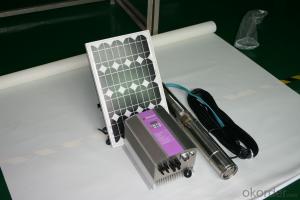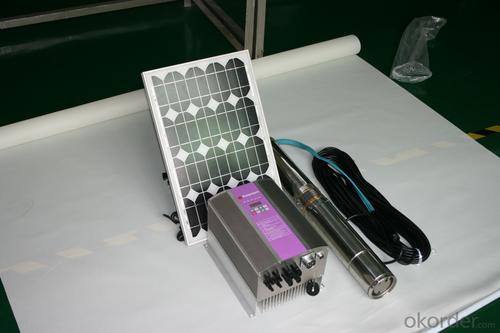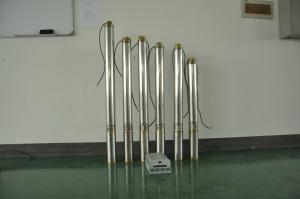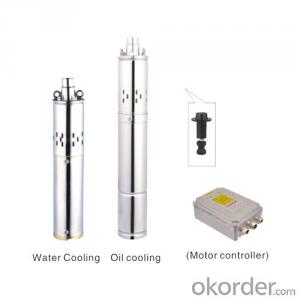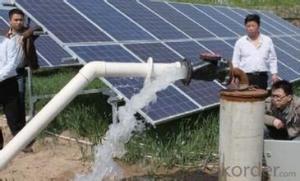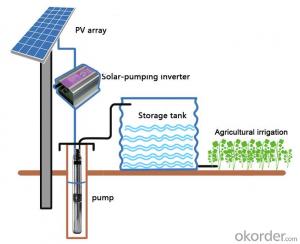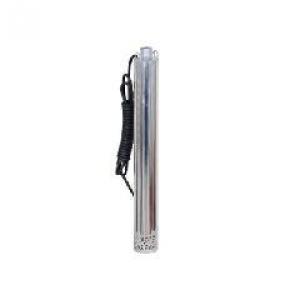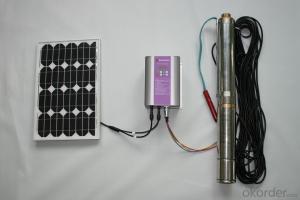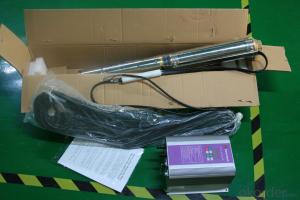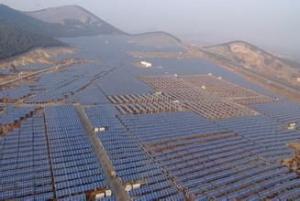Sf2 Solar Pump Ac Solar Pumping Systems
- Loading Port:
- Shekou
- Payment Terms:
- TT OR LC
- Min Order Qty:
- -
- Supply Capability:
- 100000000000000000000 /month
OKorder Service Pledge
OKorder Financial Service
You Might Also Like
Products
Solar Pumping System supplied by Shenzhen Solartech Renewable Energy Company(manufacturer) can be applied to daily use (ground water), agricultural irrigation, forestry irrigation, desert control, pasture animal husbandry, water supply for islands, wastewater treatment engineering, and so on. Solartech” Solar water pump System is dispensed with energy storing devices, and stores water instead of electricity. It improves the reliability of the device, at the same time, it lowers the construction and maintenance costs of the irrigation system dramatically.
In recent years, with the promotion of the utilization of new energy resources, Solar Pumping System is more and more used in municipal engineering, city centre squares, parks, tourist sites, resorts and hotels, the landscapes and fountain irrigation systems in the residential areas.
Technical Features
Optimization of Single Pump System
A single solar irrigation system consists of only one pump, a power -matched solar array and an inverter . The aim of optimization is to reduce the amount of PV modules as much as possible on the premise of filling the requirement of head and capacity. The rotational speed of pump is regulated according to the irradiation on the solar array; when the sunlight reaches its peak, the pump runs at the rated speed, and the output approaches the peak power of the solar array; when the sunlight is less abundant, the speed of pump varies bellow the range of the rated speed; when the speed as low as the capacity becomes zero, the solar pumping system stops working. So, there are big differences between solar irriation systems and traditional pumping systems in system design, and the system should be optimized according to the requirements of head, capacity, and local conditions of sunlight.
•Determine the optimal average daily operating time and the range of speed governing.
•Choose the optimal head and capacity of the pump.
•Determine the maximum power of PV modules, the best working voltage and method of connection.
Optimization of Multi-pump Systems:
There are several pumps in a multi-pump system. The pumps can be driven either by only one high-power inverter, or by several matching inverters. In the case of large capacity demand, the operation of the multi-pump system is more flexible. By switching solar arrays and pumps, all of the pumps run in MPPT mode when the sunlight is abundant, while some pumps will be shut down and all solar arrays supply power intensively for the rest running pumps when irradiation is weak. Based on the optimization of single pump system, the range of speed can be further optimized, and the photovoltaic(PV) pumping system always works with high efficiency.
Product Specifications
Model | Rated Power ( kW ) | Rated Voltage ( V ) | Head ( M ) | Daily Flow ( ㎥/ D ) |
PS370 | 0.37 | 220 | 20-47 | 20-1 |
PS550 | 0.55 | 220 | 15-70 | 40-1 |
PS750 | 0.75 | 220 | 6-81 | 100-1 |
PS1100 | 1.1 | 220 | 8-93 | 100-1 |
PS1500 | 1.5 | 220 | 7-128 | 130-1 |
PS2200 | 2.2 | 380 | 12-163 | 130-1 |
PS3000 | 3 | 380 | 9-187 | 250-10 |
PS4000 | 4 | 380 | 6-225 | 500-10 |
PS5500 | 5.5 | 380 | 10-172 | 500-20 |
PS7500 | 7.5 | 380 | 15-237 | 500-20 |
PS9200 | 9.2 | 380 | 20-140 | 500-40 |
PS11000 | 11 | 380 | 23-159 | 500-40 |
PS13000 | 13 | 380 | 27-189 | 500-40 |
PS15000 | 15 | 380 | 31-208 | 500-40 |
PS18500 | 18.5 | 380 | 39-143 | 500-100 |
PS22000 | 22 | 380 | 25-86 | 700-210 |
PS26000 | 26 | 380 | 30-105 | 700-210 |
PS30000 | 30 | 380 | 35-125 | 700-210 |
PS37000 | 37 | 380 | 40-150 | 700-210 |
PS45000 | 45 | 380 | 50-180 | 700-210 |
PS55000 | 55 | 380 | 65-200 | 700-210 |
- Q: Can a solar pump be used for landscape watering?
- Certainly! Landscape watering can indeed be done using a solar pump. These pumps are specifically designed to capture solar energy and convert it into power for pumping water. As a result, they offer an environmentally friendly and cost-effective option for landscape irrigation. Solar pumps have the capability to extract water from various sources, including ponds, wells, or rainwater harvesting systems, and distribute it to the desired areas within your landscape. Whether you have a small residential garden or a large commercial landscape, solar pumps can be utilized. Moreover, thanks to advancements in solar technology, these pumps have become increasingly efficient and dependable. Consequently, they now offer a sustainable solution for landscape watering, reducing reliance on traditional electricity sources.
- Q: How do I ensure the longevity of the solar panels used in a solar pump system?
- To ensure the longevity of the solar panels used in a solar pump system, it is important to follow a few key practices. Firstly, regular maintenance is crucial, including cleaning the panels to remove any dirt or debris that may accumulate. Additionally, inspecting the panels for any signs of damage or wear and tear is important, and addressing any issues promptly can help prevent further damage. It is also essential to ensure that the panels are installed in an optimal location where they receive maximum sunlight exposure and are not obstructed by shading. Lastly, protecting the panels from extreme weather conditions such as hail or heavy snowfall can also help prolong their lifespan.
- Q: How does a solar pump help in promoting sustainable development?
- A solar pump helps in promoting sustainable development by providing a reliable and clean source of energy for water pumping. It reduces the dependence on fossil fuels and minimizes greenhouse gas emissions, contributing to environmental conservation. Additionally, solar pumps can improve access to reliable water supply in remote areas, enhancing agricultural productivity, economic growth, and social well-being, especially in developing regions.
- Q: How much maintenance is required for a solar pump?
- Solar pumps require minimal maintenance compared to traditional pumps. The main maintenance tasks include ensuring the panels are clean and free from debris, checking the connections for any loose wires, and periodically inspecting the pump for any signs of damage or wear. Overall, the maintenance requirements for a solar pump are minimal, making them a cost-effective and hassle-free option for water pumping.
- Q: Can a solar pump be used in areas with limited access to water desalination systems?
- Yes, a solar pump can be used in areas with limited access to water desalination systems. Solar pumps are an efficient and sustainable solution for accessing water from various sources such as rivers, lakes, wells, or even the ocean. While they do not directly desalinate water, solar pumps can be used to extract water from saline sources, and then alternative methods like solar stills or other desalination systems can be employed to treat the water and make it suitable for consumption or irrigation.
- Q: Can solar pumps be used in areas with high temperature or extreme weather conditions?
- Yes, solar pumps can be used in areas with high temperature or extreme weather conditions. Solar pumps are designed to withstand varying weather conditions, including high temperatures, heavy rain, and strong winds. They are built with durable materials and have protective features to ensure their proper functioning in challenging environments. Additionally, solar pumps are highly efficient and reliable, making them suitable for use in areas with extreme weather conditions.
- Q: Can a solar pump be used for drinking water supply?
- Yes, a solar pump can be used for drinking water supply. Solar pumps are specifically designed to run on solar energy, making them an eco-friendly and cost-effective option for water supply. These pumps use solar panels to convert sunlight into electrical energy, which is then used to power the pump and extract water from a well or other water source. The water can be stored in a tank or directly supplied for drinking purposes. Solar pumps are commonly used in remote areas where access to electricity is limited, providing a reliable and sustainable solution for drinking water supply.
- Q: Can a solar pump be used in areas with frequent power outages?
- Yes, a solar pump can be used in areas with frequent power outages. Since solar pumps are powered by solar energy, they do not rely on the electrical grid for operation. This makes them a reliable and sustainable solution for areas where power outages are common.
- Q: Can a solar pump be integrated with other renewable energy sources like wind turbines?
- Yes, a solar pump can indeed be integrated with other renewable energy sources like wind turbines. This integration allows for a more efficient and reliable water pumping system, as it leverages the combined benefits of both solar and wind energy. By combining these two renewable energy sources, the system can operate even when one source is not generating sufficient power. This integration maximizes the overall energy production and enhances the sustainability of the water pumping system.
- Q: Can a solar pump work at night?
- No, a solar pump cannot work at night because it relies on sunlight to generate the necessary power to operate. Solar pumps use photovoltaic panels to convert sunlight into electricity, which is then used to power the pump. Without sunlight, there is no source of energy for the pump to function. However, some solar pumps may have the capability to store excess energy generated during the day in batteries, which can then be used to power the pump at night or during cloudy days. These batteries act as a backup power source when sunlight is not available.
Send your message to us
Sf2 Solar Pump Ac Solar Pumping Systems
- Loading Port:
- Shekou
- Payment Terms:
- TT OR LC
- Min Order Qty:
- -
- Supply Capability:
- 100000000000000000000 /month
OKorder Service Pledge
OKorder Financial Service
Similar products
Hot products
Hot Searches
Related keywords
